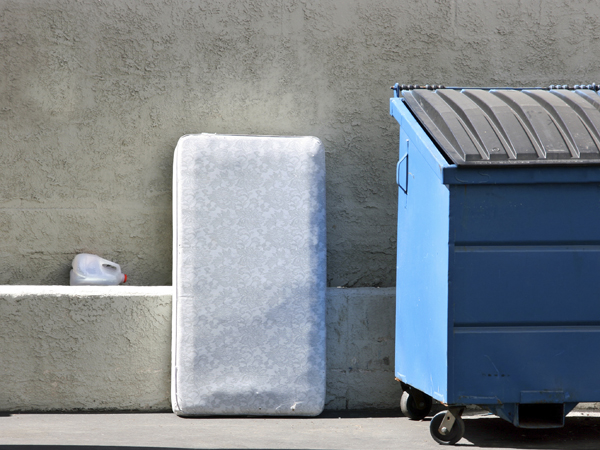 by Samantha Wittchen
by Samantha Wittchen
Even in the world of landfilling—a world created by unwanted and discarded items—mattresses are unwelcome residents. They’re bulky and difficult to compress, and they frequently damage landfill machinery. Nearly 40 million mattresses are discarded each year, and with each mattress occupying up to 23 cubic feet, that’s over 900 million cubic feet of landfill space, or Lincoln Financial Field filled to the top row of seating nine times.
Over 90 percent of a mattress’s components are recyclable, so it only makes sense to keep them out of landfills. Only a handful of companies and municipalities across the country have taken it upon themselves to handle mattress recycling. A quick Earth911.com search for facilities in Philadelphia yielded no results within 25 miles and only a few within 50 miles, most of which were only for residents of a particular municipality. It’s no wonder abandoned mattresses have become a staple of vacant lot detritus here in Philly.
However, there is a ray of hope on the mattress recycling horizon. Rubicon National Social Innovations, a California-based nonprofit committed to scalable social enterprise, wants to open a mattress recycling facility in Philadelphia. In March 2009, the nonprofit partnered with Goodwill Silicon Valley to open a pilot facility in San Jose, CA that employs homeless veterans to process the mattresses. Now that they’ve worked out the kinks, they’re ready to scale up the operation, according to Jonathan Harrison, Rubicon National’s Director of Operations. The facility in Philadelphia will process at least 10,000 mattresses per month, and it will provide work for community residents who are the most difficult to employ, such as homeless veterans and the formerly incarcerated.
Harrison says that Rubicon National, working with Goodwill and Resources for Human Development, has completed the business plan and feasibility studies for the facility, and they are ready to go live once they receive commitments from industry and municipalities—including the City of Philadelphia—that they will provide the necessary supply of mattresses to make the operation viable. The hope is that the facility will open later this fall, although Harrison would not identify an exact timetable or facility location since there is no final operating agreement in place yet.
In the meantime, the best option is to make sure you purchase a mattress from a company with a program to take your used mattress and recycle it when it’s worn out. Residents can urge the city to offer mattress recycling and commit to the new facility by contacting their councilperson and the Streets Department. Not only would the city save money on disposal costs, but it might even help clean up those vacant lots.


does anyone know if this facility exists yet in philly or not? i need to replace my mattress and i would rather not throw it away if another option is available.